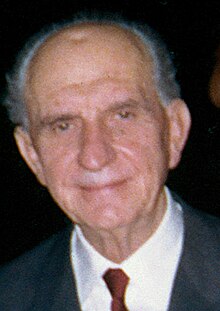Georgios Papandreou
Georgios Papandreou ( Greek Γεώργιος Παπανδρέου ; * February 13, 1888 in Kalentzi in Achaia ; † November 1, 1968 under house arrest in Athens ) was a Greek politician and Prime Minister of Greece from 1944 to 1945 and 1964 to 1965. Georgios Papandreou is the father of Andreas Papandreou and grandfather of Giorgos Andrea Papandreou .
Life
After studying law in Athens and Berlin , Papandreou, a supporter of the liberal Prime Minister Eleftherios Venizelos , was Prefect of Lesbos in 1916 and Governor of Chios from 1917–1920 , where his son Andreas was born in 1919 . His wife was Zofia (Sofia) Mineyko, daughter of a Polish engineer Zygmunt Mineyko , who was involved in the Greek fight for freedom against the Ottomans. In 1923 Papandreou was elected to parliament. From 1930 to 1932, as Minister of Education in the Venizelos cabinet, he launched a large-scale school education program. In the following years he turned away from Venizelism because of the putschist methods and founded the small Democratic Socialist Party .
The Metaxas dictatorship drove him into exile. Briefly arrested by the Axis powers, he fled to Cairo in 1944 and became Prime Minister of the government-in-exile of national unity. As such, he returned to Greece after the liberation in October 1944. After the communist uprising, Papandreou, a staunch anti-communist, was replaced as head of government in early 1945. In 1950/51, as the leader of the Georgios Papandreou party, he was involved in the formation of several short-lived center coalitions.
In 1961 Papandreou founded the Enosis Kendrou (EK, Greek ΄Ενωση Κέντρου , center union ), in which the liberal and centrist groups, which had been split up until then, came together. This became the second largest political force in the elections in October 1961; Papandreou, however, questioned the legitimacy of the right's victory in these elections, which led to bitter political disputes for years.
In November 1963 and February 1964 the EC won the parliamentary elections and Papandreou became Prime Minister. The implementing its reform program - particularly in the education sector - was soon overshadowed by a new Cyprus conflict , conspiracy suspicions about his by him appointed as a minister in the government son Andreas Papandreou and disputes over the control of the Defense Ministry with the young King Constantine II. The successful In July 1965, with the help of defectors from the EK (led by Konstantinos Mitsotakis ), Papandreou was ousted from the government.
A series of unstable governments and intensified political conflicts followed. The confused situation was to be cleared up in May 1967 by the new elections that Papandreou had long called for. In order to prevent Papandreou's feared election victory, a military junta seized power in the state with a coup on April 21, 1967 . Papandreou was arrested, then placed under house arrest, where he died in 1968. His funeral, attended by a fifth of the population of Athens, was the first manifestation of resistance to the dictatorship.
literature
- Richard Clogg : History of Greece in the 19th and 20th Centuries. A demolition. Romiosini, Cologne, 1997, ISBN 3-929889-13-7 .
- Georg Veloudis: Papandreu, Georgios . In: Biographical Lexicon on the History of Southeast Europe . Volume 3. Munich 1979, pp. 393-395
Web links
- Newspaper article about Georgios Papandreou in the press kit of the 20th century of the ZBW - Leibniz Information Center for Economics .
| predecessor | Office | successor |
|---|---|---|
| Alexandros Svolos |
Prime Minister of Greece 1944–1945 |
Nikolaos Plastiras |
| Stylianos Mavromichalis |
Prime Minister of Greece 1963 |
Ioannis Paraskevopoulos |
| Ioannis Paraskevopoulos |
Prime Minister of Greece 1964–1965 |
Giorgos Athanasiadis-Novas |
| personal data | |
|---|---|
| SURNAME | Papandreou, Georgios |
| ALTERNATIVE NAMES | Papandreou, Giorgos |
| BRIEF DESCRIPTION | Greek politician |
| DATE OF BIRTH | February 13, 1888 |
| PLACE OF BIRTH | Kalentzi |
| DATE OF DEATH | 1st November 1968 |
| Place of death | Athens |

